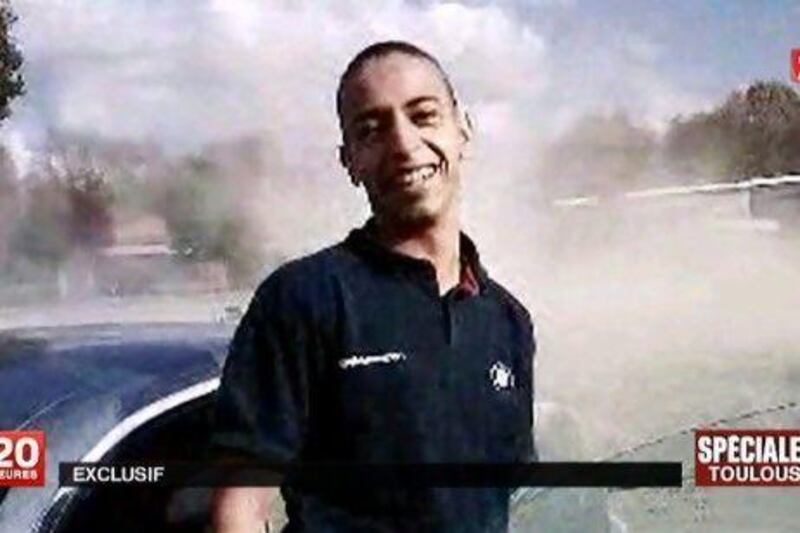MARSEILLE, FRANCE // A television broadcast of some of the last words of Mohamed Merah, who killed seven people in the name of jihad before being shot dead by French police, has angered François Hollande's government and victims' families.
Police have launched an inquiry to establish how France's largest private television channel, TF1, obtained the recordings of conversations between Merah and officers trying to negotiate his surrender.
An Algerian lawyer for Merah's father, also called Mohamed, is due in France today to present evidence supporting claims that the gunman could have been captured alive. She questioned the timing of the broadcast, describing it as a "piece of theatre". The audio recordings cover four of the 32 hours during which Merah was besieged in his Toulouse flat in March by members of an elite police unit, Raid.
The daily newspaper Le Monde and internet sources have also published extracts from transcripts.
In the first airing, on TF1's Seven to Eight programme shown on Sunday night, Merah, 23, who was French of Algerian descent, is heard boasting with no obvious note of remorse about his murders of three Jewish children, the father of two of them and three off-duty French soldiers. He makes clear his resolve to resist arrest.
"I haven't done this with the intention of letting myself be captured," Merah said in calm, measured terms with a lilting accent betraying his south-western France upbringing.
"We're negotiating but beyond that, don't forget I have weapons. I know how you operate when you intervene.
"I know that there's a chance you could kill me; that's a risk I take. So there you are: remember you are up against a man who is not afraid of death.
"I love death as you love life."
The various leaks of the conversations show that, speaking in turn to a Raid officer and "Hassan", a French interior intelligence agent, Merah taunted the authorities for their failure to detect what he claimed was his involvement with Al Qaeda.
He discussed others he had targeted - including "Hassan" - and admitted that he helped finance his activities, including weapons purchase, by acting as a getaway driver for gangsters at €10,000 (Dh45,290) a job.
He said Al Qaeda contacts suggested he could carry out attacks in the United States or Canada. His reply was that since he was French, it would be easier for him to conduct operations in France.
Merah recognised "Hassan" as the agent who has questioned him after he had visited Pakistan and Afghanistan. "Do you believe I'd be a tourist in Pakistan and Afghanistan. Do you know anyone who goes there on holiday? Al harb khoudaa - do you know what that means? It means war is a ruse.''
Adding that when he was questioned, he had already been "in contact" with Al Qaeda and told the agent: ''I think that's one of the biggest mistakes of your career.''
Mr Hollande's interior minister, Manuel Valls, condemned the channel's transmission of the extracts, which went ahead despite official appeals.
Mr Valls said the decision was made without respect for relatives of the people who died in a series of shootings in Toulouse and Montauban between March 13 and 19.
His ministry added that a criminal investigation was under way into both the leak of the recordings and the broadcast, which could be seen as a breach of judicial confidentiality.
Lawyers for some of the bereaved families said relatives were "outraged", a sentiment that Richard Prasquier, head of the French Jewish representative body, Crif, said he understood. "I find the families' reactions justified,' he said. "Hearing this killer's swagger is unbearable for the families."
The Al Jazeera network had previously agreed not to screen footage of the attacks filmed by Merah himself. The film was on an USB memory stick that arrived at the network's Paris offices after the killings and Merah's death.
Police have already raided the offices of Elephant and Co, the production company that made the programme for TF1's Seven to Eight.
But TF1 defended its actions. The recordings included "very important information" that justified the decision to broadcast, according to the channel's news director, Catherine Nayl.
"We did this with a perfect awareness of its news value," she said. "I think this document proves that, right up to the end, the negotiators were trying to detain Mohamed Merah alive …
"All this information, which is new in the Merah case, seemed important to us to broadcast. We are journalists, our job is to inform."
She denied that TF1 was guilty of sensationalism but accepted that victims' families could have found the broadcast upsetting.
Zahia Mokhtari, the lawyer representing Merah's father, wondered why TF1 broadcast the recordings a few days before she has due to hand over copies of videos made by Merah, along with other evidence, to the French authorities.
She suspected the involvement of "shadowy people". Merah's father returned from France to his native Algeria when his son was five,
Ms Mokhtari is seeking to show that Merah was manipulated by French intelligence and that more could have been done to capture him alive.
foreign.desk@thenational.ae
* Additional reporting by Agence France-Presse







